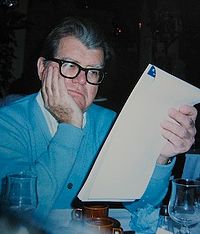William Holmes Crosby Jr.
He published more the 450 peer-reviewed papers in the field, as well as those of oncology, gastroenterology, iron metabolism, nutrition and general medical practice.
After the outbreak of World War II, Crosby served two years at as an instructor in the Army's Medical Field Service School at Carlisle Barracks, Pennsylvania.
After the war Crosby returned as an instructor to the Army's Medical Field Service School, now moved to Fort Sam Houston, Texas.
From there, he enrolled in an internal medicine residency at Brooke General Hospital where he was put in charge of an over-flow ward.
He discovered at that time that there was no hematology support in the state of Texas and thus was forced to engage in an intense self-study course in the field.
Soon after, Crosby was transferred to Pratt Diagnostic Hospital, which later became the New England Medical Center, as a hematology fellow.
Upon his return in 1951, Crosby established both the hematology and oncology specialties at Walter Reed Army Hospital a position he would hold until 1965.
As a hematologist he continued in his research in the metabolism of iron, an essential component of red blood cells.
In 1965, after more than 25 years of service, he retired from the Army to succeed William Dameshek at Tufts-New England Medical Center in Boston.
Seven years later he moved on to Scripps Clinic and Research Foundation in San Diego, Calif., where he established a training program in hematology-oncology.
He served another four years at Walter Reed and retired again into private practice in Joplin, Missouri where he spent the rest of his life, continuing to write papers on a variety of subjects.


